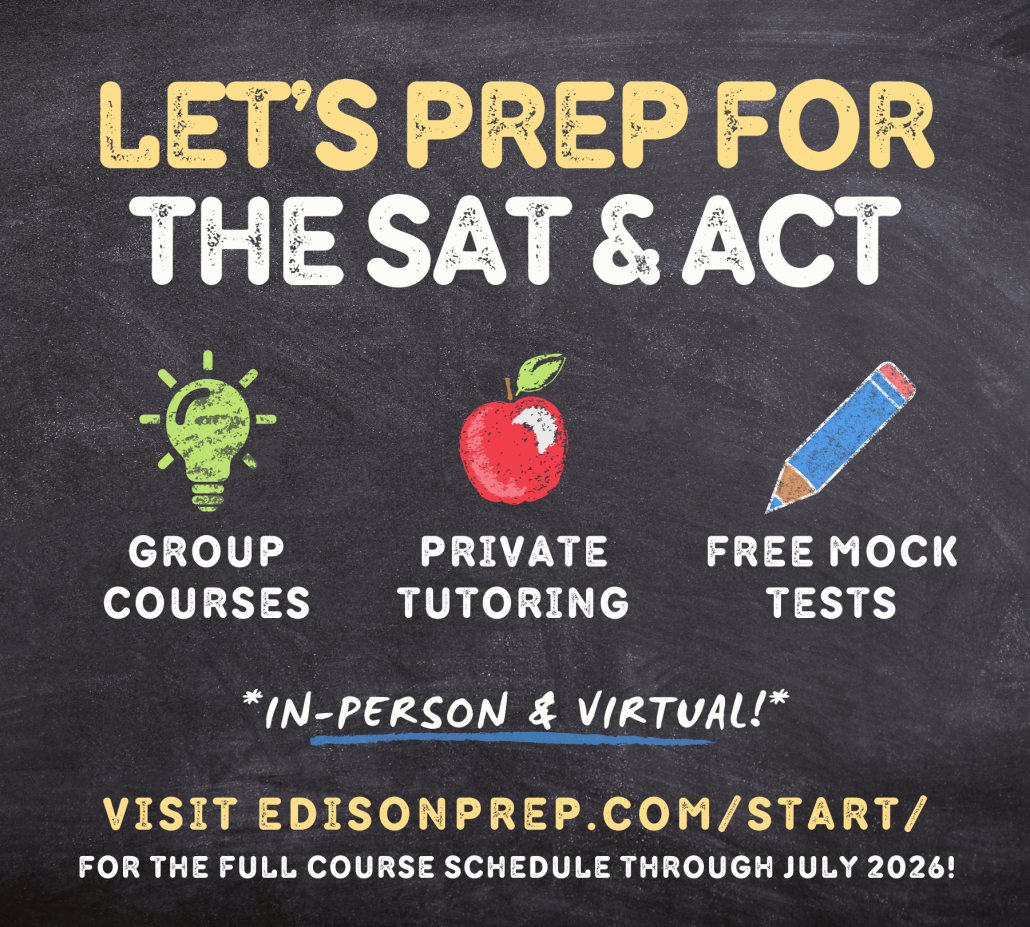Report from the Front Lines: Taking the December 10th ACT
Silvia and I both take the SAT and ACT multiple times each year to keep a pulse on how the test is shifting and to keep current. Our students’ feedback since last June has been that the math and science sections have been getting noticeably harder, both in content but more importantly speed (difficulty finishing in time).
The ACT has tacitly admitted that they are making the science and math tests harder by recently coming out with the 3rd version of the ACT Red Book that now has 5 tests instead of 3. If you happen to have this book in your house, you can compare the difficulty and the grading grids of the first 3 tests (the old ones) with the latter 2 (the new ones) and see the difference.
So many insights struck me during and after the test that I wanted to write a blog post while it was fresh and share them with our Edison Prep parents and partners.
Observations from the December ACT Testing Room: Key Takeaways for Both Parents and Students
- Make sure that you take the test with writing (the essay). Many colleges (including 4 of the 5 most popular schools that our students apply to) will consider your ACT score invalid without an accompanying essay. I was taking the test at a prominent suburban high school where it seemed many students had received tutoring and had access to information, yet almost 40% of those taking it today did not take the essay. Finding out late in the game that you need to go re-take the ACT because you didn’t do the essay does not make for a stress-free senior year. (UGA) (GaTech) (Auburn) (Emory) (Alabama)
- You must use your entire time allotted on each section. Silvia and I do well on the tests – top 1% scores each time. And we do so because we use all of our time. You must pace yourself, check your work, skip difficult problems initially and come back later. Almost half of the students in my room closed their books 5+ minutes early on most sections, with some even finishing 10 or more minutes early! This is sheer insanity: throwing entire points of your composite score (and potentially thousands of parents’ extra dollars paid in tuition or student loans borrowed) down the drain. Two composite ACT points can be the difference between paying $100K in out-of-state tuition versus getting the HOPE scholarship at increasingly difficult places to get into such as UGA and Georgia Tech.
- Math is now a sprint, not a marathon. Because math is 60 minutes, students are often lulled into feeling that they have a vast chunk of time in which to do the 60 math problems. However, if your student is shooting for a 27+ in the math section, finishing will be a difficult task. The 15 hardest problems on today’s test required a combination of speed, facility with one’s TI-84 calculator, and advanced-level trigonometry and logarithm knowledge that students would have had to memorize beforehand to get those problems correct.
- Manage your time by doing the hardest ones last. Each question is worth the same amount of points. Therefore, skip hard ones and come back to them later to maximize your total number of correct questions. For 90% of students—and for Silvia and me—the Science section is the hardest section to finish in time. The Science section has 40 questions in 35 minutes. I completed the 32 that I found relatively straightforward first, and circled 8 excruciating ones for later. Those 8 questions eventually took me 10 minutes to understand and complete. They constituted 29% of my time but only 15% of the total questions. Students who complete their questions in strict numerical order will end up leaving many easy ones blank at the end due to stubbornly getting stuck on the 8 or more questions that they found very difficult early on.
- Wear a digital watch that makes no noise. Because of the sensitive nature of timing for the ACT, having a watch that helps you monitor your time after you finish each passage is a great tool. However, your watch absolutely cannot make noise during the test or you will be dismissed. Approximately 15% of my room seemed to have a watch that they were actively using when I checked during the break. Given that our proctor did not even write the start/stop times on the board as suggested, having a watch was doubly crucial today.
- Answer every question since there is no penalty for wrong answers. While the ACT proctor reminds students of this at the beginning of the exam, students who don’t budget their time wisely may forget to allot time for actually bubbling in their random guesses as the final minute or two is elapsing. Leaving answers blank is the worst sin on this list, since guesses are simply free points. If an average student omits 16 questions versus randomly bubbles those 16 blanks in, he or she would gain roughly an entire point towards his or her composite score.
- Buy an actual copy of your test booklet and your answer sheet after the test by ordering the “Test Information Release” for certain test dates. For the December, April, and June test dates each year, you can order a copy of your test and answer sheet to be mailed to you 6-8 weeks after the test. This is the best bang for the buck you’ll get anywhere in the tutoring world — you can see exactly what went wrong the first time. In our experience, less than 10% of people have ever heard of this product, though it shows up at check-out when signing up online. If you didn’t order it in the past, you can order it for approximately 3 months after the fact.
Hopefully this list of tips has been helpful; feel free to print it for your student or forward this page’s URL to others who may benefit from it!
If you have any questions about SAT/ACT preparation, please don’t hesitate to email us at [email protected] or call 404-333-8573.
Thanks!









